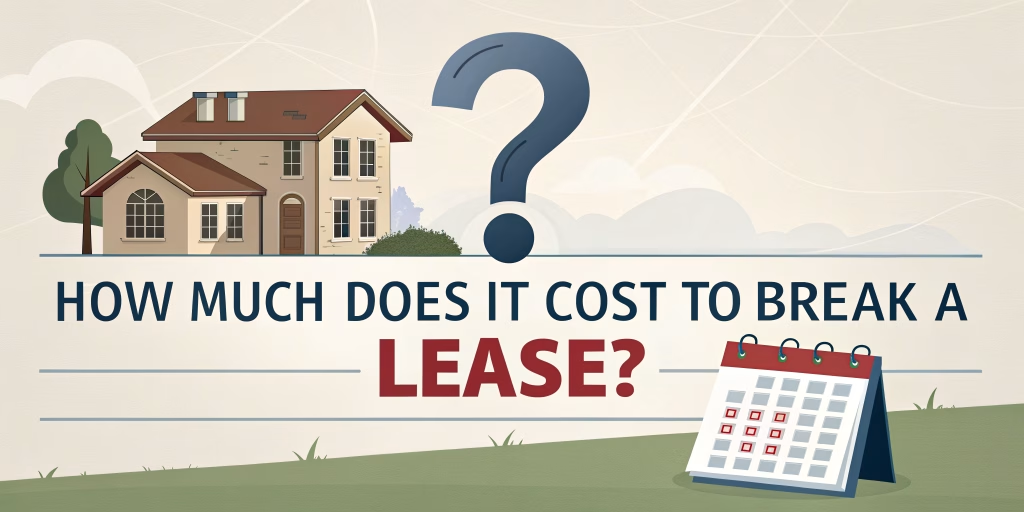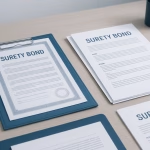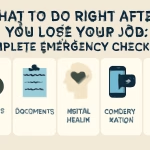How much does it cost to break a lease? My friend had to leave his place early for work. He was scared about the money he’d lose. Today, we’ll talk about why people break leases. We’ll examine the costs and discuss how to do it correctly. If you need to move or just want to know, this guide will help. We’ll use simple words and real facts to explain everything.
Why People Break Leases
There are many reasons to break a lease. It’s not an easy choice. Life changes, such as new jobs, family issues, or health problems, can necessitate relocation. The U.S. housing group reports that 30% of renters face this issue. You need to know your options.
However, some reasons are good, while others are bad. If you just don’t like your place, that’s not a good reason. Your landlord and the law may not accept it. Know the difference to make wise choices.
Good Reasons to Break a Lease
Some reasons are legally okay. These might let you break your lease without hefty fees:
Job Move: If work makes you move far away, many states let you end your lease. This is very common.
Family Crisis: When someone becomes seriously ill or passes away, you may need to terminate your lease. Laws often help in these cases.
Unsafe Home: If your place has mould, damage, or other dangers, you may have the right to leave. The home must be safe to live in.
You need proof for these reasons. Gather papers and photos to support your case. This helps you stay in control.
Bad Reasons to Break a Lease
Some reasons won’t work. Not liking your place or wanting to upgrade are not good reasons. These can cost you money. You may have to pay the remaining rent or cover advertising costs for new renters. This is why people ask about the cost of breaking a lease.
State Laws Are Different
Each state has its own rules. Some states help renters more. Others help landlords more. In California, renters have more rights. In Texas, the rules are more rigid. You might pay rent until someone new moves in.
Check your local laws. Websites like Nolo offer valuable information for free.
Know Your Rights
Your rights matter when it comes to leases. Knowing them helps you feel safe:
Safe Home Right: You can live in a safe, clean place.
Fair Process Right: If you break your lease for good reasons, the process must be fair. You get proper notice and can tell your side.
Paper Right: If your home is unsafe, you can request repair records to support your claim
Learn these rights. They help you communicate more effectively with your landlord.
What Landlords Must Do
Landlords have rules, too. They must follow the law when ending leases. They should explain fees clearly. They can’t punish you for good reasons to break your lease. They should try to find new renters fast. This can lower your costs.
Money Problems From Breaking a Lease
This is the big question: how much does it cost to break a lease? The money problems can be significant.
Types of Fees
Breaking a lease can cost you:
End Fee: A set fee in your lease. It could be one month’s rent or more.
Leftover Rent: You might pay rent until someone new moves in.
Office Costs: Some landlords charge for ads and paperwork.
Credit Score Hit
Breaking a lease can hurt your credit score. If you don’t pay the fees or appear in court, it will be reflected on your credit report. This can drop your score by 50 points in bad cases.
Finding New Renter Costs
Sometimes, landlords require you to pay to find new renters. This covers ads and work time. These costs can range from hundreds to thousands of dollars.
All these add up. Plan carefully before breaking your lease.
Talk to Your Landlord
Good talk can help lower costs and stress.
Be Open
As soon as you know you might break your lease, talk to your landlord. Be honest about your problem. Listen to their worries. A nice talk can lead to a deal that saves you money.
Ways to Negotiate
Find a New Renter: If you can find someone to take your place, many landlords will let you go without hefty fees.
Show Your Papers: Job letters or medical bills can help you get better terms.
Ask for Payment Plans: If there’s a fee, ask to pay it over time instead of all at once.
These steps show you’re trying to be fair.
Papers to Help Your Case
Have papers ready:
Medical Bills: For health reasons.
Work Letters: For job moves.
Old Emails: Any discussions with your landlord regarding issues.
Stop Lease Breaks Before They Happen
It’s better to avoid problems:
Read Your Lease
Before you sign, read everything. Ensure you are familiar with the early end rules. Ask questions if you’re confused. Set clear expectations from the start.
Tips for Renters
Stay in Touch: Communicate with your landlord when issues arise.
Report Problems Quickly: Inform your landlord about repairs promptly.
Get Flexible Terms: Try to get subletting or early end rules in your lease.
What Landlords Should Do
Landlords can help by:
Adding End Rules: Clear Ways to Terminate Leases Early.
Clear Policies: Written rules about lease breaks.
Fix Problems: Good care means fewer people want to leave.
Ways to End Early
You have options if you need to leave early:
End Clauses
Many new leases have special end rules. These tell you:
When You Can Leave Early: Like if repairs aren’t made.
What It Costs: Clear fees and rules.
These provide a legal way out with fewer conflicts.
Subletting
Subletting means finding someone to take over your lease. This works because:
No Penalties: The landlord still gets rent.
Need Approval: Always check if your lease allows this.
Many renters use this to handle surprise moves. It’s a good alternative to paying to break your lease.
Make a Deal
Sometimes the best choice is to work out a deal with your landlord. When both sides agree, everyone wins. You can obtain lower fees or even no fees at all.
Get Legal Help
Know when to use a lawyer:
When to Call a Lawyer
Get legal help if:
Your Lease is Hard to Read: Too much legal talk.
You Can’t Agree: When Negotiations Stop Working.
Your Rights Are at Risk: A lawyer protects you and helps you avoid unfair fees.
Types of Legal Help
Look for:
Real Estate Lawyers: They know property laws.
Renter Groups: Free or cheap advice.
Legal Aid: A good option if you don’t have much money.
Questions to Ask
Before hiring a lawyer, ask:
- How many lease cases have you handled?
- What might happen in my case?
- How much will you charge?
These questions help you find good help.
Final Thoughts
Breaking a lease can be a stressful and challenging experience. However, knowing the facts helps you handle it more effectively. From good reasons to break a lease to money costs, being informed is your best tool.
Common Questions
Many renters ask these questions:
Q: What should I think about before breaking my lease?
A: Think about whether your reason is legal. Learn your state’s rules. Guess the costs. Consider your financial and credit future. Do your homework first.
Q: How much does it cost to break a lease?
A: It varies a lot. It could be an end fee or several months of rent plus more costs. State rules, your lease terms, and finding new renters all affect this cost.
Q: Can breaking a lease hurt my credit?
A: Yes, if you don’t pay fees or if your landlord reports it. This is why you should work things out nicely.
Q: Can I avoid breaking my lease?
A: Yes. Try subletting, discuss early termination rules with your landlord, or negotiate a deal to end your lease early. Good lease terms and open talk are your best protection.





